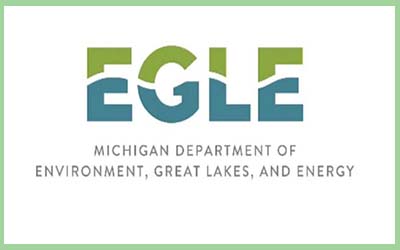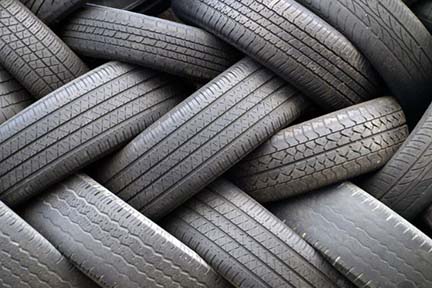April 16, 2025
Contact: Joanne Foreman, 517-284-5814
Plans for the April 30 NotMISpecies webinar on tree health and climate change have hit a snag – actually, thousands of snags. The session’s presenters are among the many Michigan Department of Natural Resources staff members working to clear tree debris and assess forest damage following the devastating, unseasonal ice storm in northern Michigan. The session has been rescheduled for Aug. 27. All registrations for April have been transferred to the new date.
The monthly, hourlong webinar series will be back on track in May, providing information on invasive species programs, current research and emerging issues in the state and the Great Lakes region. Question and answer sessions and links to resources help attendees get the most out of each presentation.
Aquatic detectives
 Often, invasive aquatic plants exist unseen, lurking and spreading below the waterline until they’ve grown into a major problem. Fortunately, a trained eye can find these invaders before they wreak havoc. That’s where the MiCorps Cooperative Lakes Monitoring Program’s Exotic Aquatic Plant Watch comes in! Join Erick Elgin and Jo Latimore from Michigan State University Extension for “What Lies Beneath: Detecting Invasive Plants in Michigan Lakes” (9 a.m. Wednesday, May 28). The duo will reveal the training and tools available to help volunteers detect and track these underwater invaders. Hear firsthand from dedicated volunteers who have made surprising discoveries in the lakes they cherish. Whether you’re a seasoned lake steward or just getting started, this webinar will inspire you to take a closer look beneath the surface! Often, invasive aquatic plants exist unseen, lurking and spreading below the waterline until they’ve grown into a major problem. Fortunately, a trained eye can find these invaders before they wreak havoc. That’s where the MiCorps Cooperative Lakes Monitoring Program’s Exotic Aquatic Plant Watch comes in! Join Erick Elgin and Jo Latimore from Michigan State University Extension for “What Lies Beneath: Detecting Invasive Plants in Michigan Lakes” (9 a.m. Wednesday, May 28). The duo will reveal the training and tools available to help volunteers detect and track these underwater invaders. Hear firsthand from dedicated volunteers who have made surprising discoveries in the lakes they cherish. Whether you’re a seasoned lake steward or just getting started, this webinar will inspire you to take a closer look beneath the surface! |
Can you dig it?
Hydrilla is known as one of the most difficult aquatic invasive plants to control. When it was found for the first time in Michigan in September 2023, the Michigan Invasive Species Program chose to take decisive action to eradicate it. Join project lead Billy Keiper of the Department of Environment, Great Lakes, and Energy’s Water Resources Division for “Digging in: Michigan’s Unconventional Response to Hydrilla” (9 a.m. Wednesday, June 25). Keiper will walk through the response effort from detection to the recent excavation of two private ponds. Learn about the why and how behind this extraordinary effort and the deliberation, planning and cooperation that made it possible.
Hitting the spot
 Invasive spotted lanternfly, first detected in Pennsylvania in 2014, is now present in at least 18 eastern U.S. states. In Michigan, localized spotted lanternfly infestations in four southeastern counties are expected to build and spread, especially in areas where invasive tree of heaven, the insect’s preferred host, occurs. In “Spotting the Spotted Lanternfly: What to Know and What You Can Do” (9 a.m. Tuesday, July 29), Deborah McCullough, professor of forest entomology at Michigan State University, will cover spotted lanternfly’s life stages, tree of heaven identification and spotted lanternfly’s impacts on trees and people. Options for managing spotted lanternfly, if or when it arrives in your neighborhood, will be included. Invasive spotted lanternfly, first detected in Pennsylvania in 2014, is now present in at least 18 eastern U.S. states. In Michigan, localized spotted lanternfly infestations in four southeastern counties are expected to build and spread, especially in areas where invasive tree of heaven, the insect’s preferred host, occurs. In “Spotting the Spotted Lanternfly: What to Know and What You Can Do” (9 a.m. Tuesday, July 29), Deborah McCullough, professor of forest entomology at Michigan State University, will cover spotted lanternfly’s life stages, tree of heaven identification and spotted lanternfly’s impacts on trees and people. Options for managing spotted lanternfly, if or when it arrives in your neighborhood, will be included. |
Trees at risk
(Rescheduled from April 30)
Invasive insects and diseases, including hemlock woolly adelgid, beech bark disease and beech leaf disease, are taking a toll on Michigan’s forests. As if this weren’t enough, the changing climate is further stressing trees and may lead to greater impacts by both invasive and native insects and diseases. Join forest entomologist Erin Biggs and forest pathologist Simeon Wright of the DNR for “They’ll Need that Hug: How Climate Change is Increasing Native and Invasive Threats to Michigan’s Trees” (9 a.m. Wednesday, Aug. 27). The duo will explain emerging issues, how they are being addressed, and which may have the biggest effect on Michigan’s forests and urban landscapes.
Recorded versions of all previous webinars are available on the NotMISpecies webpage.
Michigan’s Invasive Species Program, a collaborative effort of the departments of Natural Resources; Environment, Great Lakes, and Energy; and Agriculture and Rural Development, coordinates and supports invasive species initiatives across the state and provides support through the Michigan Invasive Species Grant Program.
Note to editors: Accompanying photos are available below for download. Caption information follows.
Rake toss: Michigan State University Extension’s Jo Latimore brings in a rake full of aquatic plants for analysis.
Spotted lanternfly: An adult invasive spotted lanternfly rests on the trunk of an invasive tree of heaven, its favorite host plant. |








